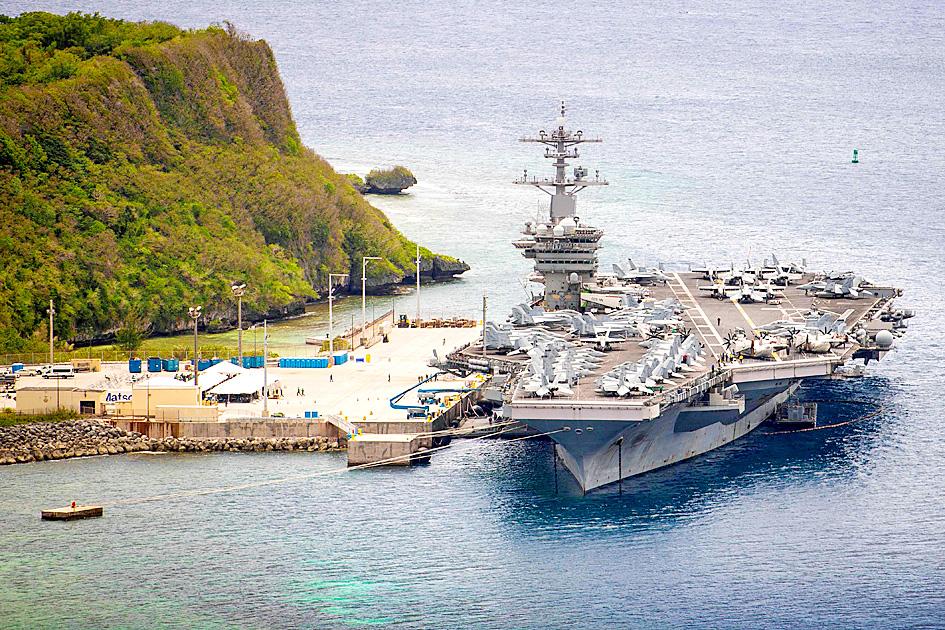The US military on Friday said that Chinese military flights in the past week in the South China Sea fit a pattern of destabilizing and aggressive behavior by Beijing, but posed no threat to a US Navy aircraft carrier strike group in the region.
“The Theodore Roosevelt Carrier Strike Group closely monitored all People’s Liberation Army Navy and Air Force activity, and at no time did they pose a threat to US Navy ships, aircraft, or sailors,” the US military’s Pacific Command said in a statement.
A US official, speaking on condition of anonymity, said the Chinese aircraft did not come within 250 nautical miles (463km) of the US Navy vessels.

Photo: AFP/US Navy/Conner D. Blake/Handout
Taiwan reported that several Chinese air force aircraft flew into the southwestern corner of its air defense identification zone last weekend, near the Taiwan-controlled Pratas Islands (Dongsha Islands, 東沙群島), including fighter jets and nuclear-capable H-6 bombers.
Regional security and diplomatic sources familiar with the situation said China’s air force was dispatched on missions beginning mid-morning on Saturday last week, coinciding with the US carrier group passing south of the Pratas Islands.
China, which has long geared its military toward defending itself against the US, was conducting exercises that would simulate an operation against an aircraft carrier, the sources said.
“They purposely conducted the drills when the US carrier was passing through the Bashi Channel,” one source said, referring to the waterway between southern Taiwan and the northern Philippines.
“That was not just meant for Taiwan. Most importantly, China is trying to tackle the issue of the South China Sea: It wants to stop the US military from entering the South China Sea. China wants to diminish the United States’ weight in the western Pacific,” the source said.
The sources spoke to reporters on condition of anonymity, as they were not authorized to speak to the media.
The Chinese Ministry of National Defense did not immediately respond to a request for comment.
On Thursday, the ministry toughened its language toward Taiwan, warning after last weekend’s stepped-up military activity near the nation that “independence means war,” and that its armed forces were acting in response to “provocation” and foreign interference.

MAKING WAVES: China’s maritime militia could become a nontraditional threat in war, clogging up shipping lanes to prevent US or Japanese intervention, a report said About 1,900 Chinese ships flying flags of convenience and fishing vessels that participated in China’s military exercises around Taiwan last month and in January have been listed for monitoring, Coast Guard Administration (CGA) Deputy Director-General Hsieh Ching-chin (謝慶欽) said yesterday. Following amendments to the Commercial Port Act (商港法) and the Law of Ships (船舶法) last month, the CGA can designate possible berthing areas or deny ports of call for vessels suspected of loitering around areas where undersea cables can be accessed, Oceans Affairs Council Minister Kuan Bi-ling (管碧玲) said. The list of suspected ships, originally 300, had risen to about 1,900 as

Right-wing political scientist Laura Fernandez on Sunday won Costa Rica’s presidential election by a landslide, after promising to crack down on rising violence linked to the cocaine trade. Fernandez’s nearest rival, economist Alvaro Ramos, conceded defeat as results showed the ruling party far exceeding the threshold of 40 percent needed to avoid a runoff. With 94 percent of polling stations counted, the political heir of outgoing Costa Rican President Rodrigo Chaves had captured 48.3 percent of the vote compared with Ramos’ 33.4 percent, the Supreme Electoral Tribunal said. As soon as the first results were announced, members of Fernandez’s Sovereign People’s Party

Japan’s strategic alliance with the US would collapse if Tokyo were to turn away from a conflict in Taiwan, Japanese Prime Minister Sanae Takaichi said yesterday, but distanced herself from previous comments that suggested a possible military response in such an event. Takaichi expressed her latest views on a nationally broadcast TV program late on Monday, where an opposition party leader criticized her for igniting tensions with China with the earlier remarks. Ties between Japan and China have sunk to the worst level in years after Takaichi said in November that a hypothetical Chinese attack on Taiwan could bring about a Japanese

MORE RESPONSIBILITY: Draftees would be expected to fight alongside professional soldiers, likely requiring the transformation of some training brigades into combat units The armed forces are to start incorporating new conscripts into combined arms brigades this year to enhance combat readiness, the Executive Yuan’s latest policy report said. The new policy would affect Taiwanese men entering the military for their compulsory service, which was extended to one year under reforms by then-president Tsai Ing-wen (蔡英文) in 2022. The conscripts would be trained to operate machine guns, uncrewed aerial vehicles, anti-tank guided missile launchers and Stinger air defense systems, the report said, adding that the basic training would be lengthened to eight weeks. After basic training, conscripts would be sorted into infantry battalions that would take